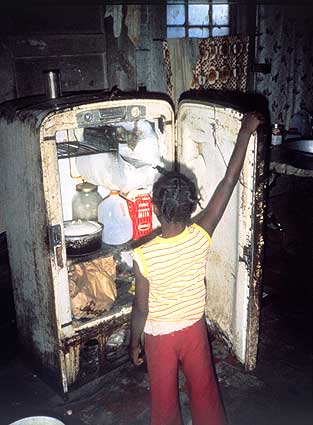The answer, on one level, is simple. In a country with more than enough food to feed every citizen well -- by well I mean a nutritional diet sufficient to provide for required caloric intake for activities undertaken in a normal lifestyle -- you'd think the answer would be yes.
My memory harkens back to the Tea Party debate during the Republican primary season of the 2012 presidential election when in response to a Wolf Blitzer hypothetical question about an underinsured young adult -- "Should we just let him die?" -- to which members in the audience quickly and spontaneously screamed, before candidate Ron Paul could answer, "Yeah!!"
That answer articulated loud and clear that the personal-responsibility, libertarian, "why don't you just get a goddam job, loser!" crowd feels little empathy for the less fortunate. In fact, it's a clear statement that, in the context of hunger, basically tough shit, it's not my problem. And, yes, that position is properly identified with the more conservative members of our American body politic.
And quite recently that position -- it's not our job to feed people -- was concretely demonstrated by the $40 billion cut to food stamps passed by Republican-controlled House and blocked by the Senate. The Senate attempted to compromise at a $4 billion cut, but the bill is stalled. Yes, Republicans want to severely cut food aid to the American poor.
The poor already have lost $5 billion with the expiration on Nov. 1st of the Recovery Act provision providing for a temporary boost to the food stamp program.
The 2009 Recovery Act’s temporary boost to Supplemental Nutrition Assistance Program (SNAP) benefits is scheduled to end on November 1, 2013, resulting in a benefit cut for every SNAP household. For families of three, the cut will be $29 a month — a total of $319 for November 2013 through September 2014, the remaining months of fiscal year 2014. That’s a serious loss, especially in light of the very low amount of basic SNAP benefits. Without the Recovery Act’s boost, SNAP benefits will average less than $1.40 per person per meal in 2014. (See Table 2 for estimates of the size of the SNAP cut in each state in fiscal year 2014.) Nationally, the total cut is estimated to be $5 billion in fiscal year 2014.
It seems unlikely that Congress will enact legislation to remedy this problem, as President Obama and some members of Congress have proposed.So we have a pitched battle in Congress, with Democrats seeking to protect the food safety net for the poor and the Republicans seeking to cut it severely. The USA Today article linked to above described the debate by saying the "Bill demonstrates a bitter philosophical divide between Democrats and Republicans over the social safety net."
This "bitter philosophical divide" positions the Republican stance as:
1. We should limit the government's ability to feed the poor.
and/or
2. We can't afford to feed the poor.It's fair to say the Democrats' position is that we can maintain or expand the government's role in feeding the poor and that we can or must afford to do so.
All right, the battle lines are drawn. But I propose to go further with this philosophical divide and ask:
In a country in which we produce a vast surplus of every conceivable food product that would contribute to a healthy, balanced diet, do we or do we not have a moral obligation to make every effort to provide such a diet to every person?My answer is yes, absolutely.
There are more aspects to this question and answer, such as:
- If we have more than enough land in the U.S. to provide all families suffering from hunger some land on which to grow or produce adequate food -- but that this land is already owned by large commercial enterprises and a few remaining family farms and therefore not available to hungry citizens -- then don't the controlling corporations and land-owning entities have a moral obligation to share the bounty with those denied access to land for food production?
- Since our free-enterprise system and evolved civilization that now allow specialization of labor leaving us no longer dependent on the food we can grow or hunt, and which means that access to land for food production is no longer required in order to have an abundant source of food available, don't those of us, whose opportunity for work and access to capital deprives them of an adequate source of food, deserve access to a healthy, adequate diet?
- What is the moral justification for allowing any citizen to suffer from hunger and malnutrition?
- Is a there a dividing line in our country between an obligation to feed our citizens and an obligation to feed any human being within our borders? In other words, should citizens be fed while non-citizens starve? Is that a moral dividing line?
- If the answer is yes, all human beings within our borders, given our food abundance, deserve an adequate diet, what entity is best suited to carry out this enterprise? Government? Charities? Churches? All of them? Only Some of them?
Wolf Blitzer: "So if the person didn't have enough food to eat, should we just let him starve?"
You:"Yeah!!"Well then, shame on you.



No comments:
Post a Comment